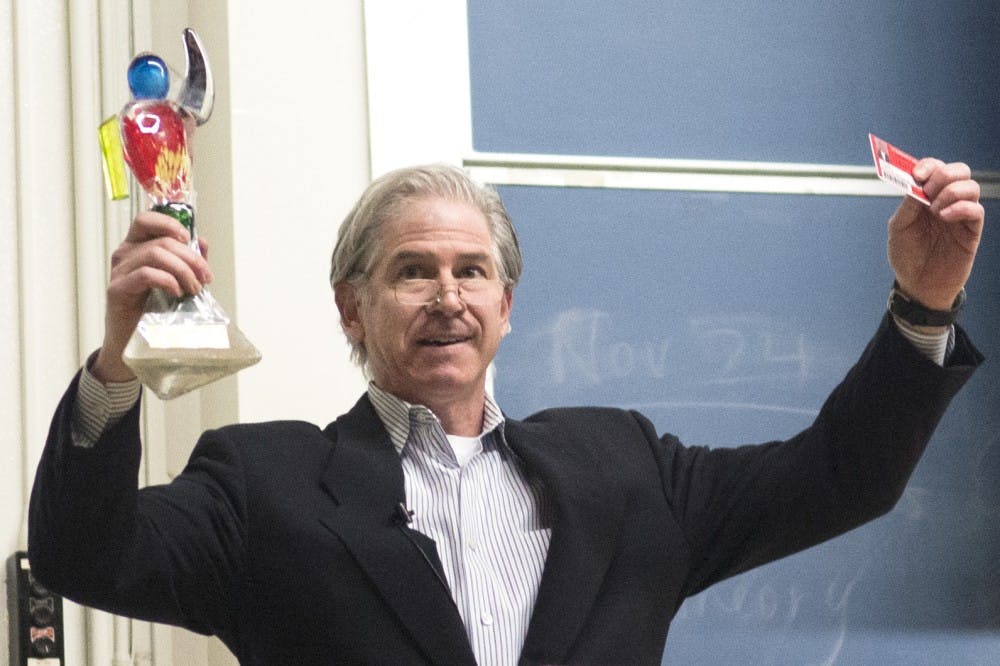“I got both of these for doing the exact same thing,” he said before a crowd of eager UNM business students.
Fastow went on to talk about his role in the biggest corporate scandal of the century and the lessons he learned about the ethics of business.
In 2001 the Securities and Exchange Commission investigated Fastow’s role in hiding massive amounts of Enron’s debt using off-balance sheet accounting and special-purpose entities. Fastow was eventually convicted of fraud, money laundering and conspiracy, and was forced to forfeit nearly $24 million in assets. He was sentenced to six years in federal prison and was released in December 2011.
At the start of the lecture, Fastow joked with the audience about being confused each time he is asked to speak on the topic of ethics.
“I think inviting me to talk about business ethics is a bit like inviting Kim Kardashian to talk about chastity,” he said.
The collapse of Enron was a dramatic example of the failure of business people to put principles before rules, Fastow explained — a mistake that corporations and governments still make to this day.
For six years in a row Fortune magazine named Enron the “Most Innovative Company,” and Fastow himself was praised for his creative use of structured finance and off-balance sheet accounting.
“I didn’t set out to commit fraud,” Fastow said. “I cannot remember any time that I ever considered I was committing fraud.”
Fastow described the strange world that a CFO operates in, a gray area where the rules set by regulators are complex, vague and sometimes non-existent. This gray area can be seen as an opportunity, a chance for businesses to interpret the rules to suit their needs, he said.
In these situations it is incredibly important for individuals and organizations to recognize unethical behavior and determine the best ways to proceed, he said.
“I thought I was so smart; I thought I was a hero for bending the rules,” Fastow said. “It comes down to individual people making a decision — we always asked ‘is it allowed?’ not ‘is it the right thing to do?’”
Get content from The Daily Lobo delivered to your inbox
Linda Ferrell, a UNM professor of marketing who also works as the Bill Daniels Professor of Business Ethics, helped to secure Fastow as a speaker in the Daniels Fund Ethics Initiative series.
The Daniels Fund Initiative is involved in principle-based business ethics education mostly for students in institutions of higher learning: something that is vital to the future of corporate America, Ferrell said.
“A lot of business schools may be covering these issues in a few classes, or they may have one elective class students can take. But they’re not pervasively thinking about having speakers in like Andy Fastow, and talking to diverse audiences that are not just a class here or there in the college of business,” Ferrell said. “It cuts across and creates a dialogue around ethical leadership in organizations, and the challenges that people are going to face when they start their careers.”
Fastow discussed corporations like General Motors and IBM, and entire governments like Greece, which have used creative work-arounds and took advantage of regulatory loopholes to achieve short-term gains that resulted in long-term disasters.
Every day, corporate accountants cut and paste numbers in spreadsheets to magically turn problems into profits, kicking the can down the road until their problems become unmanageable, he said.
The obsession of the corporate world with short-term profits, huge bonuses and stock prices has created a dangerous culture in which business people look for every shortcut and loophole they can find to make their numbers, despite the long-term consequences, he said.
His message to the students was simple: rules and regulations are not enough. Only employees can make a difference by standing up and saying “no” when they encounter unethical practices in their business careers.
“You can always find an attorney to get you the answer you want. You can always find an accountant to get you the answer you want,” Fastow said. “There’s only one gatekeeper — you.”
Jonathan Baca is the news editor at the Daily Lobo. He can be contacted at news@dailylobo.com, or on Twitter @JonGabrielB.






